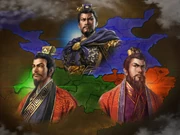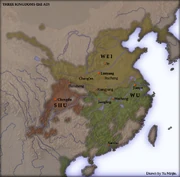
Image representing the kingdoms in Sangokushi 12. From left to right: Liu Bei, Cao Cao, and Sun Quan.
The Three Kingdoms era refers to a historical period in China that lasted from 220~280 AD. It ended the Han Dynasty and separated the land into civil conflict. Out of the warring regional lords, three of them eventually gained enough power to claim themselves as the emperors of the land.
- The kingdom of Shu Han, led by the Liu family (Liu Bei's branch)
- The kingdom of Cao Wei, led by the Cao family
- The kingdom of Eastern Wu, led by the Sun family
Technically, neither of them ruled any sort of kingdom since their lands were actually individual empires. However, the term "kingdoms" has been popularized in several translations. In Romance of the Three Kingdoms, the concept was devised by Zhuge Liang on Liu Bei's third visit but this is not the case in history. Historical records suggest that Zhou Yu and Lu Su devised the concept of two kingdoms.
Koei has the following IPs and franchises use this era as their main setting:
- Romance of the Three Kingdoms series including its spin-offs in the Eiketsuden series
- Dynasty Warriors series
- Kessen II
- Dynasty Tactics
- Dynasty Tactics 2
History
Beginning
Arguably, the beginning of each country's military affairs began when the Yellow Turban Rebellion broke out in 184. The weakened Han empire was being suppressed by the rebels until He Jin organized an army to oppose them. Even when the rebellion was dispelled, the Han continued to be plagued by natural disasters and ill-timed tragedies within the court. He Jin supposedly wanted to sustain the dynasty when Emperor Ling passed away, leaving a dispute between his two heirs, Liu Bian and Liu Xie. With Yuan Shao's support, he planned to remove the scheming eunuchs from capital but was assassinated before his plans could come to fruit.
Yuan Shao and a handful of men duly murdered the eunuchs afterwards but their actions triggered Dong Zhuo to approach the capital. His capable military leadership drove them into a civil conflict. He manipulated the succession and placed Liu Xie on the throne as Emperor Xian, deposing Emperor Ling's immediate successor, Liu Bian. The coalition against Dong Zhuo then argued between themselves on whether to place a new emperor, the kind warlord Liu Yu, as a replacement.
Dong Zhuo obeyed yet lacked the political etiquette and tact to sustain the land for long. His rude manners and brutality instigated several revolts against him led by Yuan Shao and Sun Jian. The emperor and Dong Zhuo escaped to Chang'an though the warlord wasn't killed until his subordinates, Wang Yun and Lu Bu, mutinied against him in 192. Because of Wang Yun's actions, however, four of Dong Zhuo's former generals: Li Jue, Guo Si, Zhang Ji, and Niu Fu were able to slay him, repel Lu Bu, and take hostage of the emperor, causing further calamity to the court.
Acting under the Han, Cao Cao continued his conquest to Tao Qian, who was supported by Liu Bei and Gongsun Zan. He was foiled by Lu Bu attacking his base, Yan Province, and was forced to retreat. Tao Qian soon passed away, and his province of Xu was then ruled by Liu Bei.
In 195, Lu Bu was defeated and fled to Liu Bei for safety.
Meanwhile, in the south, Sun Ce succeeded his father and served for a time under Yuan Shu. His quick and successful conquests earned him a grand reputation with his lord. Yuan Shu, confident in his subordinates, declared himself as emperor in 197. Sun Ce did not agree with the decision, abandoned him, and negotiated with Cao Cao to destroy him. With Liu Bei and Lu Bu, the coalition surrounded Yuan Shu and forced him to flee. After this conflict, Lu Bu betrayed his benefactor, gaining control of Xu, and attempted to seal an alliance with Yuan Shu. Liu Bei fled to Cao Cao for safety and they both allied together to siege Lu Bu's base, Xiapi. Due to betrayal amongst his officers, Lu Bu was defeated and executed.
Rise to Power
In 200, Dong Cheng, an officer of the court and imperial in-law, received a secret edict from the emperor to assassinate Cao Cao. He collaborated with Liu Bei and others on this effort, but Cao Cao soon found out about the plot and had the conspirators executed. Only Liu Bei survived and fled to Yuan Shao in the north. After settling the nearby provinces and internal affairs with the court, Cao Cao turned his attention north. Yuan Shao, who came from higher nobility than Cao Cao, amassed a large army and camped along the northern bank of the Yellow River. In the same year, Sun Ce was fatally wounded and names Sun Quan as his successor.
Following months of planning, Cao Cao and Yuan Shao met in force at Guandu. Overcoming Yuan's superior numbers, Cao Cao decisively defeated him by setting fire to his supplies, and in doing so crippled the northern army. Liu Bei fled to Liu Biao of Jing Province and many of Yuan Shao's forces were destroyed. In 202, Cao Cao took advantage of Yuan Shao's death and the resulting division among his sons to advance north of the Yellow River. He captured Ye in 204 and occupied the provinces of Ji, Bing, Qing and You. By the end of 207, Cao Cao had achieved undisputed dominance of the northern plains of China.
In 208, Cao Cao marched south with his army hoping to quickly unify the empire. He was able to capture a sizable fleet at Jiangling when Liu Biao's son, Liu Cong, surrendered to him. Even against the huge army, Sun Quan continued to resist. His adviser, Lu Su along with Liu Bei's Zhuge Liang, secured an alliance between their lords and Sun Ce's close friend, Zhou Yu, was placed in command of Sun Quan's navy, along with a veteran officer of the Sun family, Cheng Pu. Their combined armies of 50,000 met Cao Cao's fleet and 200,000-strong force at Chibi that winter. After an initial skirmish, an attack beginning with a plan to set fire to Cao Cao's fleet was set in motion to lead to the decisive defeat of Cao Cao, forcing him to retreat in disarray back to the north. The allied victory ensured the survival of Liu Bei and Sun Quan, and provided security for the future state of Wu and Liu Bei's conquests.
After his return to the north, Cao Cao contented himself with absorbing the northwestern regions in 211 and consolidating his power. He progressively increased his titles and power, eventually becoming the King of Wei in 217, a title bestowed upon him by the puppet Han emperor that he controlled.
Liu Bei, having defeated the weak Jing warlords Han Xuan, Jin Xuan, Zhao Fan, and Liu Du, entered the western Yi province and later in 214 displaced Liu Zhang as ruler, leaving his commander Guan Yu in charge of Jing province. Sun Quan, who had in the intervening years being engaged with defenses against Cao Cao in the southeast at Hefei, now turned his attention to Jing province and the Middle Yangzi. Tensions between the allies were increasingly visible. In 219, after Liu Bei successfully seized Hanzhong from Cao Cao and as Guan Yu was engaged in the siege of Fan Castle, Sun Quan's commander-in-chief Lu Meng secretly seized Jing province, and his forces captured and slew Guan Yu.
Three Emperors
In the first month of 220, Cao Cao died and in the tenth month Emperor Xian abdicated his throne to Cao Pi. Many sources assume that the heir forced the emperor to forsake his reign thus ending the Han Dynasty. He named his state Wei and made himself emperor at Luoyang.
Liu Bei named himself Emperor of Han a year later in an attempt to restore the fallen Han dynasty. In the same year, Wei bestowed on Sun Quan the title of King of Wu. In 223, Shu Han troops declared war on Wu and met the Wu armies at the Battle of Yiling. At Yiling, Liu Bei was disastrously defeated by Sun Quan's commander Lu Xun and forced to retreat back to Shu. He died soon after and was succeeded by his son, Liu Shan. Shu and Wu resumed friendly relations at the expense of Wei. In 222, Sun Quan renounced his recognition of Cao Pi's regime and, in 229, he declared himself emperor at Wuchang. Wei presided in the north, Wu was predominantly in the southeast, and Shu in the southwest. Each section seemed naturally divided, based on evidence regarding each kingdom's man-made trade routes.
Shu and Wu focused on suppressing rebellions in the south caused by indigenous tribes who weren't part of the then boarders of China. Wu forced the surrender of the Yue tribe while Shu subdued the Nanman tribe on an expedition led by Zhuge Liang. However, it was no longer a main concern as Zhuge Liang led a northern campaign against Wei in 227. He stationed the main army in Hanzhong and planned to break through to Chang'an and Luoyang. In the next seven years, Zhuge Liang executed an estimated five attempts yet ultimately failed to meet his goal due to limited food supplies. During his final campaign, he passed away on the Wuzhang Plains yet news of his death allowed Shu's safe escape since Sima Yi was hesitant to pursue.
During Shu's northern campaigns, Wu was constantly attacked by Wei at Hefei. Thanks to the natural defenses and the Yue troops, however, Wu's defenses were solid. Their well defended lands helped the technology and arts in the south to flourish.
Decline

The Three Kingdoms in 262, on the eve of the conquest of Shu.
Fall of Shu
Shu weakened after the defeat of Zhuge Liang at Wuzhang Plains. After some few decades, the eventual replacement, Jiang Wei, then continued the expeditions would attempt attacks on Wei several more times. Shu's supplies were rapidly strained by these attempts. Taking advantage, the de facto ruler of Wei, Sima Zhao, sent Zhong Hui and Deng Ai to invade Shu's capital. Zhong Hui held off Jiang Wei, while Deng Ai sneaked around to besiege the capital of Chengdu, then receiving the surrender of Liu Shan in 264. After the surrender, Jiang Wei and Zhong Hui rebelled but they and Deng Ai were killed. Liu Shan lived on, even into the time of Jin, until a natural death in 271.
Fall of Wei
After Wuzhang, Sima Yi seized power and became regent permanently putting the Sima family in Wei's government. After Sima Yi, and Sima Shi, Sima Yi's eldest son, passed away Sima Zhao took position as regent. During Sima Zhao's reign, Wei ended Shu. Sima Zhao passed away in 265 and his son, Sima Yan took over his role. Also in 265, Cao Huan stepped down and Sima Yan became emperor. Sima Yan replaced the Wei Dynasty with the Jin dynasty.
Fall of Wu
Sun Quan stopped attacking Wei after he was defeated at Hefei Castle and Wu fell into a steady decline. The first problem happened after the death of Sun Quan. Sun Quan's sons began fighting of who would become emperor. Sun Liang became emperor and corruption rose throughout the Wu Dynasty. Years later Sun Hao became emperor and promised Wu that they would become a great dynasty and promised to remove corruption throughout Wu's territory, but Sun Hao became a tyrannical ruler and Wu was corrupted even more. Starting 279, years after Jin's establishment, Sima Yan invaded Wu. In 280, Sun Hao surrendered himself to Sima Yan and the land finally became united under the Jin Dynasty. The era of the Three Kingdoms ended.
Gallery
This article is a stub. You can help the wiki by expanding it.


